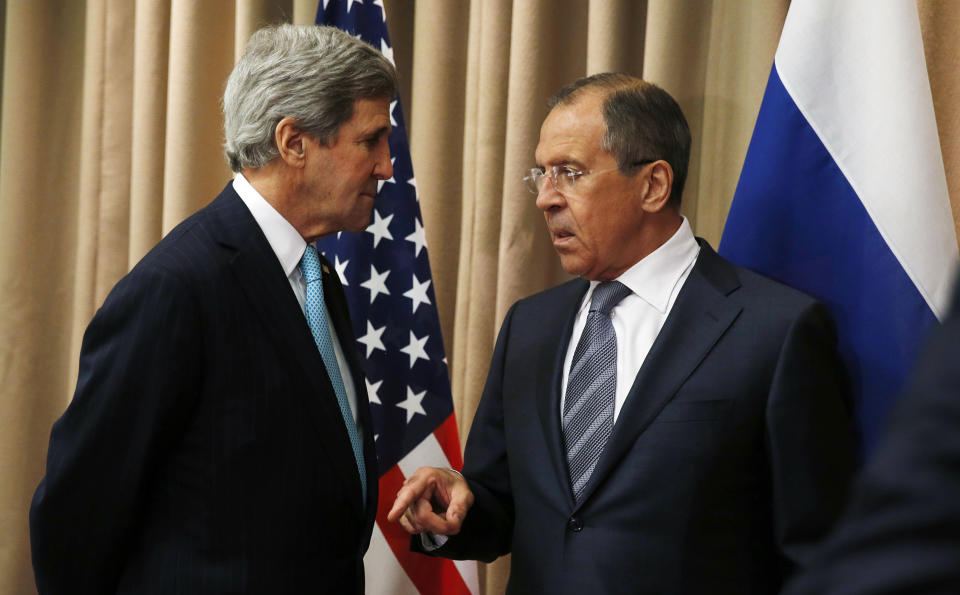Analysis: Weak US hand in Ukraine confrontation
WASHINGTON (AP) — Nearly a quarter century after the Cold War ended, the crisis in Ukraine symbolizes the weak foreign policy hand the United States often finds itself playing despite its status as the only global superpower.
With a military confrontation with Russia off the table and European allies hesitant to join Washington in more robust economic and financial sanctions against Moscow, President Barack Obama's administration has few tools that would modify Kremlin behavior in eastern Ukraine, where pro-Russian militias have made no move to vacate government buildings they seized near the Russian border. Russia, meanwhile, has rejected charges that it is fueling the unrest.
The situation only grew tenser Monday when Ukraine's acting president ordered security forces to resume operations in the country's east, and the Defense Ministry said gunfire hit an observation plane over the city of Slovyansk.
Vice President Joe Biden has made a quick trip to show support to the beleaguered interim government in Kiev, carrying a package of financial and non-lethal military aide. Secretary of State John Kerry last week in Geneva negotiated a deal with Russia, Ukraine and the European Union that was designed to ease tensions.
"The Russians don't fully accept the legitimacy of this transition government," in Kiev, said R. Nicholas Burns, a Harvard University professor and formerly undersecretary of state and U.S. ambassador to NATO. "I think one reason the U.S. and Europe are at the table (in Geneva) is that they think that by agreeing to these quadripartite negotiations that the Russians will be de facto conferring legitimacy on the Ukrainians. That's a good goal to have, but you have to be careful that we don't get out-played by the Russians."
So far, pro-Russian militias have not laid down their arms or relinquished government buildings, despite the Geneva accord calling for them to do so. Moscow, meanwhile, is demanding as well that the pro-western interim government in Kiev order the dismantling of the protest infrastructure in the capital's main Square, the Maidan. The gathering place was the scene of months of demonstrations that eventually led former Ukrainian leader Viktor Yanukovych to flee to Russia and prompted Moscow to send forces into the strategic Crimean Peninsula, where the population quickly voted to join Russia.
Now, Obama is under bipartisan pressure to increase sanctions on Russian banks and its massive oil and gas industry. The Europeans are reluctant because they rely on Russian natural gas for 30 percent of supplies. Russian President Vladimir Putin has already warned about a shutdown of supplies that run to the West in pipelines that first serve Ukraine. Hence, European Union reluctance for stronger sanctions.
The Geneva agreement required all sides to refrain from violence, intimidation or provocative actions. It calls for the disarming of all illegally armed groups and gives amnesty to protesters who comply with the demands, except those found guilty of committing capital crimes.
But there was no real way to enforce the deal. Putin denies he's playing the puppet master over the separatists, and the central Ukrainian government doesn't have the wherewithal to do the job. That's the big hole in the deal.
"The problem is the Ukrainian military is not strong enough to maintain law and order in its own country. The Russians are creating and fabricating a crisis to showcase that," Burns said.
For now, it looks very much like Putin is holding the better hand. Obama says the Russians will soon be feeling the economic pain as Washington and Europe tighten the sanctions screws. So far, however, Putin seems willing to accept that pain as part of the price for what some observers believe is his long-term goal of reconstituting as much of the old Soviet Union as he can.
Obama was prescient when, on the day the quadripartite deal was struck last week, he expressed doubt the Russia would live up to expectations.
"My hope is that we actually do see follow-through over the next several days," Obama said. "But I don't think given past performance that we can count on that, and we have to be prepared to potentially respond to what continue to be efforts of interference by the Russians in Eastern and Southern Ukraine."
___
EDITOR'S NOTE — Steven R. Hurst, an AP international political writer based in Washington, reported from Moscow for 12 years.



